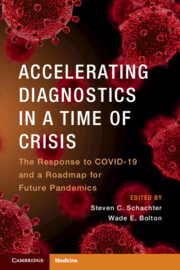 Accelerating Diagnostics in a Time of Crisis
Accelerating Diagnostics in a Time of Crisis Published online by Cambridge University Press: 06 January 2024
Constant pivoting by clinical teams and leadership was required to provide quality care during the COVID-19 pandemic. We share the roadmap used by Mount Sinai Beth Israel Medical Center, an academic tertiary care facility in the East Village of Manhattan, which is part of the Mount Sinai Health System. Lessons learned are discussed in the response of this care facility to the overwhelming influx of patients. New York City became the epicenter of COVID-19 in the United States and the disease quickly overwhelmed one of the largest cities in the world, resulting in historical shut downs that impacted the infrastructure of the city. Clinical leaders needed to act quickly in order to prepare the facility for the surge of patients, which required the creation of more than double the normal capacity of medical/surgical beds and a tripling of the number of intensive care unit beds, which resulted in a tremendous need for supplies and equipment, especially ventilators. This chapter allows readers to follow the facility as the pandemic unfolded, showing the clinical challenges that were faced as information developed and guidance changed daily regarding best practices and methods to treat patients, protect staff, and stop the spread of the virus.
To save this book to your Kindle, first ensure [email protected] is added to your Approved Personal Document E-mail List under your Personal Document Settings on the Manage Your Content and Devices page of your Amazon account. Then enter the ‘name’ part of your Kindle email address below. Find out more about saving to your Kindle.
Note you can select to save to either the @free.kindle.com or @kindle.com variations. ‘@free.kindle.com’ emails are free but can only be saved to your device when it is connected to wi-fi. ‘@kindle.com’ emails can be delivered even when you are not connected to wi-fi, but note that service fees apply.
Find out more about the Kindle Personal Document Service.
To save content items to your account, please confirm that you agree to abide by our usage policies. If this is the first time you use this feature, you will be asked to authorise Cambridge Core to connect with your account. Find out more about saving content to Dropbox.
To save content items to your account, please confirm that you agree to abide by our usage policies. If this is the first time you use this feature, you will be asked to authorise Cambridge Core to connect with your account. Find out more about saving content to Google Drive.